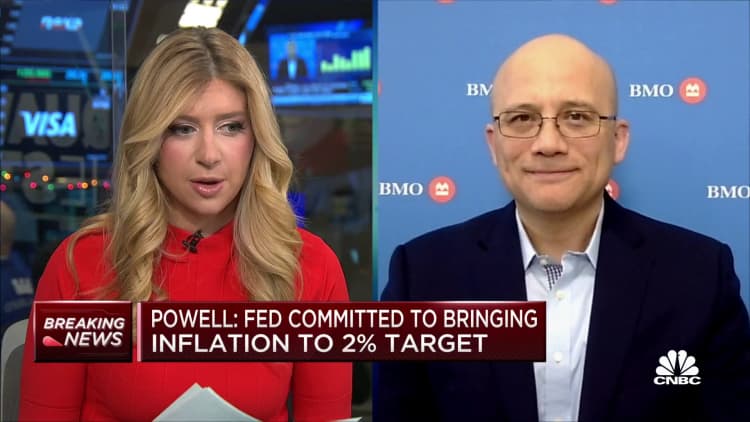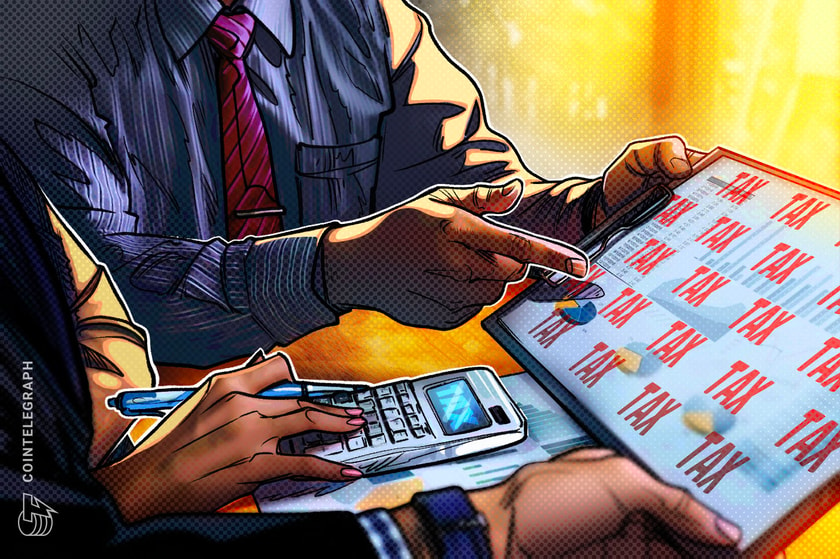
The U.S. economy reaccelerating or mildly contracting is more likely than a “soft landing.”
Source link
premature
Fed Chair Powell calls talk of cutting rates ‘premature’ and says more hikes could happen
Federal Reserve Board Chairman Jerome Powell speaks during a news conference after a Federal Open Market Committee meeting on September 20, 2023 at the Federal Reserve in Washington, DC.
Chip Somodevilla | Getty Images
Federal Reserve Chairman Jerome Powell on Friday pushed back on market expectations for aggressive interest rate cuts ahead, calling it too early to declare victory over inflation.
Despite a string of positive indicators recently regarding prices, the central bank leader said the Federal Open Market Committee plans on “keeping policy restrictive” until policymakers are convinced that inflation is heading solidly back to 2%.
“It would be premature to conclude with confidence that we have achieved a sufficiently restrictive stance, or to speculate on when policy might ease,” Powell said in prepared remarks for an audience at Spelman College in Atlanta. “We are prepared to tighten policy further if it becomes appropriate to do so.”
However, he also noted that policy is “well into restrictive territory” and noted that balance of risks between doing too much or too little on inflation are close to balanced now.

Markets moved higher following Powell’s remarks, with major averages positive on Wall Street and Treasury yields sharply lower.
“Markets view today’s comments as inching toward the dovish camp,” said Jeffrey Roach, chief economist at LPL Financial.
Expectations that the Fed is done raising rates and will move to an easing posture in 2024 have helped underpin a strong Wall Street rally that has sent the Dow Jones Industrial Average up more than 8% over the past month to a new 2023 high.
Powell’s remarks gave some credence to the idea that the Fed at least is done hiking as the string of rate hikes since March 2022 have cut into economic activity.
“Having come so far so quickly, the FOMC is moving forward carefully, as the risks of under- and over-tightening are becoming more balanced,” he said.
“As the demand- and supply-related effects of the pandemic continue to unwind, uncertainty about the outlook for the economy is unusually elevated,” he added. “Like most forecasters, my colleagues and I anticipate that growth in spending and output will slow over the next year, as the effects of the pandemic and the reopening fade and as restrictive monetary policy weighs on aggregate demand.”
A Commerce Department report Thursday showed that personal consumption expenditures prices, the Fed’s preferred inflation gauge, were up 3% from a year ago, but 3.5% at a core basis that excludes volatile food and energy prices. Recent sharp declines in energy have been responsible for much of the easing in inflation.
Powell said the current levels are still “well above” the central bank’s goal. Noting that core inflation has run at a 2.5% annual rate over the past six months, Powell said, “while the lower inflation readings of the past few months are welcome, that progress must continue if we are to reach our 2 percent objective.”
“Inflation is still running well above target, but it’s moving in the right direction,” he said. “So we think the right thing to be doing now is to be moving carefully, thinking carefully about about how things are going on letting letting the data tell us what the story is. The data will tell us whether we’ve done enough or whether we need to do more.”
After inflation hit its highest level since the early 1980s, the Fed enacted a series of 11 interest rate hikes, taking its policy rate to the highest in 22 years at a target range between 5.25%-5.5%. The FOMC at its past two meetings kept rates level, and multiple officials have indicated they think the federal funds rate is probably at or near where it needs to be.
The Fed’s next meeting is Dec. 12-13.
“The strong actions we have taken have moved our policy rate well into restrictive territory, meaning that tight monetary policy is putting downward pressure on economic activity and inflation,” Powell said. “Monetary policy is thought to affect economic conditions with a lag, and the full effects of our tightening have likely not yet been felt.”
Traders expect cuts
Market pricing Friday morning indicated that the Fed indeed is done hiking and could start cutting as soon as March 2024, according to the CME Group. Moreover, futures are pointing to cuts totaling 1.25 percentage points by the end of the year, the equivalent of five quarter percentage point reductions.
However, neither Powell nor any of his fellow officials have provided any indication that they’re thinking about cuts, with the chair adhering to data dependence for future decisions rather than any preset course.
“We are making decisions meeting by meeting, based on the totality of the incoming data and their implications for the outlook for economic activity and inflation, as well as the balance of risks,” Powell said.
Addressing the economic data, Powell characterized the labor market as “very strong,” through he said a reduced pace of job creation is helping bring supply and demand back in line.
Don’t miss these stories from CNBC PRO:

Markets commentator Jim Cramer has tacitly admitted he was wrong about Bitcoin (BTC), saying he was premature in calling for investors to sell the cryptocurrency.
In a Nov. 22 segment of his CNBC Mad Money show, Cramer responded to a caller who inquired about buying shares in Bitcoin miner CleanSpark, saying that anyone who likes Bitcoin should increase their exposure to it.
“Look, if you like Bitcoin, buy Bitcoin. That has always been my view. And for a while, I liked it, and I decided that money had been made, but I was premature.”
Cramer added that despite not having made perfect calls on Bitcoin previously, he’d still “made a lot of money” from his investment in it.
On Dec. 5, 2022, when Bitcoin was trading for $17,150, Cramer urged investors to sell all their crypto investments no matter the cost, saying it was “never too late to sell an awful position.” The price of Bitcoin has rallied 118% since, with BTC currently changing hands for $37,390.
Cramers’ predictions, along with his on-again, off-again love-hate relationship with crypto, have become a popular meme throughout investing communities over the past few years, with many pointing out his uncanny ability to make incorrect calls at key moments.
Related: Bitcoin to $1M post-ETF approval? BTC price predictions diverge wildly
In August 2022, a crypto trader claimed to have doubled the size of his portfolio simply by trading in the opposite direction to what Cramer recommended.
Two months later, on Oct. 6, an investment fund filed for an “inverse Cramer ETF” — a financial instrument designed to return results on trades “that are approximately the opposite of, before fees and expenses, the results of the investments recommended by television personality Jim Cramer.”
Finally happened: Cramer ETFs
Inverse Cramer ETF $SJIM
Long Cramer ETF $LJIM
Eff Dec 1920-25 equal-weighted stocks/ETFs based on Cramer’s Twitter & TV recommendations and market views. Positions exited if Cramer has no view & once profit targets met. pic.twitter.com/tY9yBMt15s
— ETF Hearsay by Henry Jim (@ETFhearsay) October 5, 2022
Magazine: This is your brain on crypto — Substance abuse grows among crypto traders

The president of the Stakeholders in Blockchain Technology Association of Nigeria (SIBAN), Obinna Iwunna, has commented on the implementation of the Finance Act, 2023, which was signed into law on May 28. According to Iwunna, the successful execution of the law will be challenging due to its premature introduction.
The act introduces a series of tax reforms aimed at modernizing the country’s fiscal framework. Among its provisions was the introduction of a 10% tax on gains from the disposal of digital assets, including cryptocurrencies.
In a Cointelegraph interview, Iwunna criticized implementing a 10% tax on cryptocurrencies in the current uncertain climate, likening it to putting the cart before the horse. He highlighted the ongoing issue with the Central Bank of Nigeria (CBN) instructing commercial banks not to facilitate financial transactions involving cryptocurrencies.
As commercial banks still cannot process cryptocurrency transactions, he questioned how taxing something not recognized or defined is possible, emphasizing the need for clarity and enabling infrastructure before imposing taxes. In support of this, Iwunna referenced how Nigeria’s National Information Technology Development Agency (NITDA) defined blockchain technology through a collaborative effort and formulation of a national policy.
Just read that very soon you all will start paying taxes on your crypto and Forex profits in Nigeria.
10% of your capital gains goes to government . What are we going to get in return?
— CryptoLord NE (@CryptoDefiLord) June 8, 2023
Iwunna stressed cryptocurrency involves security, currency and technology, overseen by the Nigerian Securities and Exchange Commission (SEC), the CBN and NITDA, respectively. Each entity has a specific role to play, but a comprehensive and unified understanding of cryptocurrency is crucial. Once a collective definition is established, policymakers can develop appropriate policies, regulations and taxation measures.
When asked if Nigerian crypto stakeholders have approached the SEC and CBN with their concerns, Iwunna confirmed that they have reached out and are currently awaiting a response. While some discussions have taken place, no definite decisions have been made.
Related: Binance sends cease and desist notice to fraudulent Nigerian entity
Acknowledging the government’s aim to broaden the tax base, Iwunna stated that it is important to ensure that taxation does not impede the growth of the cryptocurrency industry. Clarity is sought regarding the implications of taxation and its connection to the recognition of cryptocurrency and associated procedures.
According to Iwunna, the lack of consultation, as observed during the e-naira launch, may hinder the adoption of the tax laws. Had there been collaboration with the digital assets ecosystem, the e-naira could have seen rapid adoption by millions of Nigerians.
Magazine: Bitcoin in Senegal: Why is this African country using BTC?




